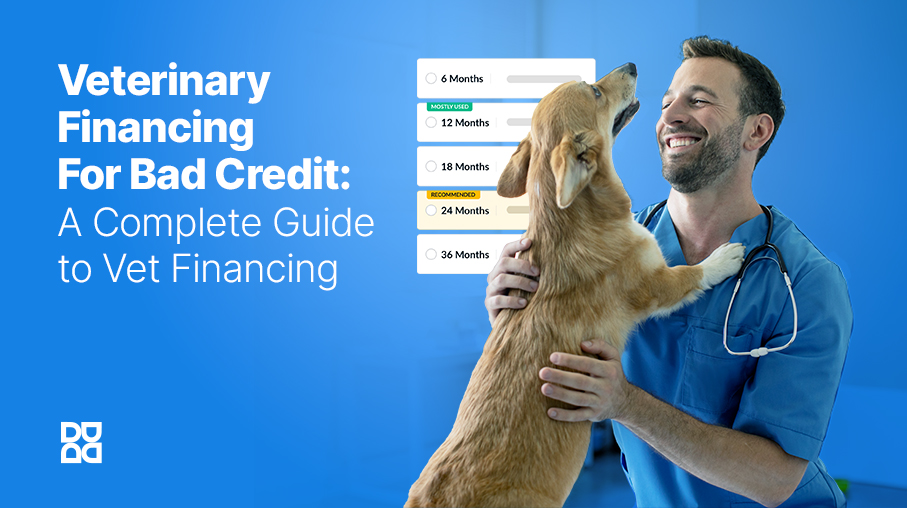
As per the 2021- 2022 National Pet Owners Survey by the American Pet Products Association (APPA), 70% of U.S. households (90.5 million) have pets.
And that comes as no surprise with every generation, from boomers to GenZ, seeking the companionship of a furry friend as a way to escape the monotony of life.
However, having a pet is a responsibility above all else, and the first question to ask before even considering bringing one home should be 'Can I take care of them, especially their health if need be?'
This is because just like medical bills, vet bills can be challenging to manage.
In 2022 alone, it was found that over 75% of pet owners reported that their pet care costs were increasing.
But that doesn't mean that should keep you from having a pet or providing them with the care they deserve.
In this blog, we'll discuss♦ Pet Ownership and Veterinary Care♦ The Importance Of Vet Visits And How To Manage Them♦ Delay In Veterinary Care: Causes And Consequences♦ Coping With The Financial Strain Of Unexpected Veterinary Emergency Costs♦ Veterinary Financing for Bad Credit: Weighing The Options♦ Limitations to Veterinary Financing♦ Denefits: A Befitting Alternative♦ Denefits Vs. Traditional Financing How To Find Vets That Provide Payment Plans
Pet Ownership and Veterinary Care
Being a pet owner comes with the great responsibility of being able to afford a vet. However, it is easier said than done.
In a proprietary survey of 1,000 pet owners, nearly 45% of participants said they take their pet to the vet twice a year. And more than 37% of participants take their pet to the vet annually, with the remainder of pet owners going to the vet only when necessary.
Notably, about 21% of pet owners have paid over $1,000 for a single veterinary emergency. This may not be as manageable for every pet owner, especially those who do not have an above-average financial standing, live paycheck to paycheck, or have a low credit score.
The Importance Of Vet Visits And How To Manage Them
Ensuring your pet's overall well-being is your primary obligation as a pet owner. That said, planning and following through with regular vet visits should be a given.
Routine vet visits are imperative for many reasons, with the top few being:
- Prevent issues; catch problems before they escalate.
- Never miss a vaccination; shield your pet from serious health issues.
- Ensure early intervention; timely care improves outcomes.
- Oral health wellness; regular checks prevent dental issues.
- Behavioral wellness; ensure a happy, balanced pet.

Get a Better Understanding of Kennel Cough in Dogs, from Symptoms to Treatment
How Much Do Routine Vet Visits Cost?
Bearing the importance of vet visits in mind, it's imperative to learn how to manage them. Here are a few tips to keep off the top of your head:
- Coordinate routine visits for preventive care.
- Establish a budget for potential veterinary expenses.
- Keep vaccination and medical history up-to-date.
- Be ready for unexpected health crises.
- Discuss concerns openly with your vet.
- Explore veterinary financing with no credit check.
- Search for vets that offer payment plans.
Delay In Veterinary Care: Causes And Consequences
Alarmingly, over a third (35%) of pet owners said they delayed an annual vet visit due to cost. Nearly a quarter (23%) of pet owners said they delayed getting their pet vaccinations or booster shots in the last 12 months due to cost.
This highlights the following causes:
- Financial constraints
- Payment uncertainties
- Insurance verification delays
- Cost discussions
- Treatment affordability concerns
And the consequences are concerning:
- Worsening health conditions
- Increased treatment costs
- Limited treatment options
- Emotional distress for owners
- Potential loss of life
Coping With The Financial Strain Of Unexpected Veterinary Emergency Costs
One of the major repercussions of delay in veterinary care is emergency vet visits.
| About 21% of pet owners have paid over $1,000 for a single vet emergency. |
This only worsens the matter as emergency vet visits often incur higher vet bills. So, how do you cope? Here are a few options to consider:
- Explore pet insurance for potential cost coverage of emergency vet costs.
- Set aside a budget to afford a vet and the emergency vet cost.
- Search veterinary financing with no credit check options.
- Look for animal hospital payment plans/animal hospitals with payment plans.
- Research for 'vet near me with payment plans', 'vets that accept payment plans', or 'vet clinics with payment plans'.
- Look into a pet card or pet credit card with bad credit options.
- Inquire about low-cost vets that take payments in monthly installments.
Don't Wait For An Emergency To Seek Vet Care
One in three pets needs emergency veterinary treatment every year and a pet receives emergency care every 2.5 seconds in the U.S.
And this is again an aftermath of delay due to the high cost of healthcare. But why wait for an emergency when you can explore veterinary financing no credit check options for routine vet care? Exactly. So, let's get right to the veterinary financing options and weigh them.
Veterinary Financing: Weighing The Options
More than 25% of pet owners claimed they were struggling to afford the rising expenses associated with pet healthcare, raising the need for veterinary financing according to a recent survey.
But What Are These Financing Options? Let's explore.
| Options | Overview | Pros | Cons |
| Credit Cards | Immediate access to credit for vet expenses. | Quick access to funds, convenient for unexpected costs | High-interest rates,potential debt accumulation |
| Personal Loans | Fixed monthly payments, potential for lower interest. | Fixed payments for budgeting, lower interest rates | Credit check required, longer application process |
| Pet Insurance | Coverage for veterinary expenses, including preventive care. | Financial assistance, routine care coverage | Monthly premiums, coverage limitations |
| Savings Account | A fund specifically for pet care emergencies. | Financial security, no interest payments | Time to build, discipline required for saving |
| Care Credit | Specialized financing for medical and veterinary expenses. | Designed for medical and vet costs, deferred interest options | Credit approval required, and penalties for late payments |
Notably, an APPA survey found that 43% of pet owners would pay for a vet emergency using a credit card or personal loan. Additionally, only 12.9% of participants said they would rely on a pet insurance policy to pay for expenses. However, in another survey, 34% of participants revealed that their reason for avoiding pet insurance is a lack of knowledge, while another 28% disclosed that they find it too expensive.
That said, there are limitations associated with each of the aforementioned financing options, whether it’s lack of knowledge, feasibility concerns, or questions about eligibility. And this not only affects pet owners but also practices. Let’s understand this impact better.
The Impact Of Limitations Within Financing Options On Practices And Pet Owners
| Impact | Veterinary Practices | Pet Owners |
| Financial Strain | Limited ability to invest in advanced equipment and technologyDifficulty in maintaining/upgrading facilities.Reduced capacity for hiring skilled staff | Limited access to essential veterinary servicesPostponement of necessary medical procedures due to cost constraints. |
| Impact on Services | Inability to offer a wide range of specialized treatments.Limited availability of preventive care programs.Reduced capacity for emergency services. | Limited access to specialized veterinary care.Incomplete preventive care for pets due to financial constraints. |
| Quality of Care | Potential compromise in the quality of medical services.Inability to adopt the latest medical advancements.Limited availability of diagnostic tests. | Suboptimal healthcare for pets due to financial limitations.Difficulty in accessing cutting-edge treatments and medications. |
| Client Relations | Strained relationships due to high service costs.Perception of prioritizing profits over animal welfare. | Dissatisfaction and frustration with the inability to afford necessary treatments.Perception of veterinary care as unaffordable. |
| Preventive Medicine | Limited promotion of preventive care due to financial constraints.Inadequate resources for educational programs. | Reduced ability to invest in preventive measures for pets.Lack of awareness about the importance of preventive care. |
| Community Impact | Reduced ability to contribute to community animal welfare programs.Limited participation in outreach and education initiatives. | Increased burden on local animal shelters due to preventable health issues.Limited community awareness about responsible pet ownership. |
Denefits: Coming To The Aid For All Pets
Now, given the limitations of traditional financing options, how do pet owners provide their furry friends with the care they deserve? This is where Denefits comes to the rescue, allowing vets to offer pet owners the ease to pay for their pet's treatment in manageable monthly installments.
Similar to veterinary financing bad credit options and animal hospital payment plans, these payment plans pose the ideal alternative for even those with bad credit. So, be sure to search for 'vets near me with payment plans', 'vets that take payments through Denefits', or 'vets that take payment plans' in your area to ensure the best care for your pet in the most feasible way possible.
Denefits Vs. Traditional Financing Options
| Aspect | Denefits | Traditional Financing |
| Credit | No Credit Check Policy | Credit check required |
| Approval Rate | 95% Approval Rate | Varies, often lower for bad credit |
| Approval Process | Fast approval process | Longer processing time |
| Payment Plans | Flexible payment plans | Fixed, less flexible repayment options |
| Accessibility | Bridges gaps for individuals with bad credit | May exclude individuals with poor credit |
| Convenience | Tailored for specific services like vet care | Generic financing options for various purposes |
Conclusion
Being a pet owner is a rewarding yet financially demanding responsibility. And the increasing costs of veterinary care pose challenges to many pet owners, often leading to delayed or skipped vet visits and potential health consequences for their pets. While traditional financing options exist, they come with their own set of limitations.
Enter Denefits - coming to your pet's aid, bridging the gaps of traditional financing options, and enabling owners to ensure timely optimal care for their pets.
So, when considering veterinary financing with no credit check options, be sure to prioritize vets that take payment plans through Denefits.
Frequently Asked Questions On Vet Payment Plans
1. How much is an emergency vet visit without insurance?
$100 to $200. Typically, the base fee for an emergency vet visit without insurance can vary, depending on several factors. To name a few, the nature of the emergency, the experience of the veterinary, and the location of the veterinary clinic.
2. What are some tips to afford vet care for my pet?
Here are a few tips to afford vet care for your pet:
3. What should I consider when looking for vets that do payment plans?
Consider looking into the eligibility criteria, call your veterinary and ask if they offer vet payment plans, and check for interest rates or additional fees.
4. How can I locate a vet near me with flexible payment plans
A simple Google search with “vets that take payment plans will give you results in the form of online directories. From there you can note down their information and call local vet clinics to inquire.
5. Can vet payment plans be used for all types of veterinary services?
Yes, more often than not, vet payment plans can be used for all types of veterinary services. However, specifics may vary. That said, it's best to consult with your veterinarian for precise information.
6. Are there specific vet clinics with payment plans?
While there aren't specific vet clinics with payment plans, it's fairly easy to locate one. Veterinarians who offer payment plans explicitly inform their clients about them, so be sure to search online and inquire with your local vet.
7. Can offering vet payment plans lead to higher revenue growth for vet practices?
Yes, offering vet payment plans can lead to potential revenue growth for vet practices as it attracts more clients and encourages regular vet visits.
8. How can in-house veterinary financing benefit vet practices?
There are numerous ways in which in-house veterinary financing benefits vet practices, including improved accessibility to veterinary care and enhanced customer loyalty. These factors contribute to an increase in clientele and revenue.
9. What happens if you can't pay a vet bill?
Your vet will send payments to a collection agency in most cases. This, in turn, can affect your credit score, and some vets will refuse to provide any services in the future.
10. Do you have to pay vet bills upfront?
Some vets may require upfront payments. It's best to consult with your vet for specific information regarding payment options.


